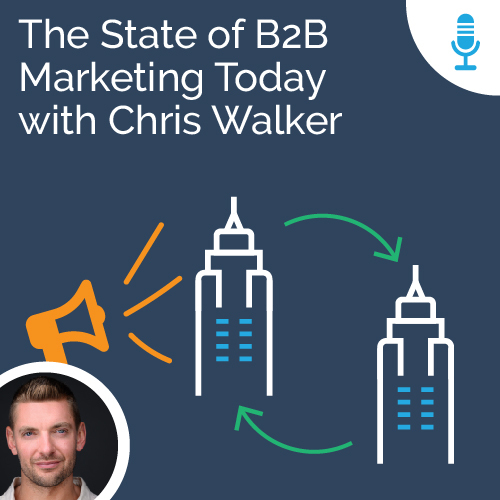The State of B2B Marketing Today with Chris Walker
Episode Notes
In this episode, we’re talking with Refine Labs CEO Chris Walker about the state of B2B marketing today Chris also offers numerous tips for B2B marketers, too.
Additional Resources:
B2B Marketing Tips You Have Not Thought Of
Transcription
Speaker 1:
This is Salesforce Simplified, the podcast from Ad Victoriam Solutions. Here’s your host, Mike Boyle.
Mike Boyle:
Hello everyone and welcome. Today on the Ad Victoriam Salesforce Simplified podcast, we’ve invited Refine Labs CEO Chris Walker to talk about the state of B2B marketing today. Now, before we begin, a little bit about Chris. He leads a powerful team of folks at Refine Labs, that would be refinelabs.com, which is challenging the current reality of B2B marketing and sales. He and his team help B2B companies change how they think about measuring and executing marketing so they can stop worrying about lead volume and start generating revenue.
Now, in addition to his CEO duties at Refine Labs, Chris also hosts Revenue Vitals podcast, which mixes live Q and A and chats with some of today’s top B2B leaders to share some tangible advice and tactics. And he also creates some really exceptional content daily on LinkedIn, which is how we found Chris. So if you’re in the B2B marketing space, you just need to start following Chris today. Make sure that’s the first thing you do after you listen to today’s podcast. With all that, Chris, welcome to the Salesforce Simplified podcast. We’re big fans and it really is a pleasure to have you here with us today.
Chris Walker:
Mike, I really appreciate the amazing intro. You got such a great radio voice, and looking forward to getting into this.
Mike Boyle:
Let’s talk about the state of B2B marketing. What are some common mistakes that you see B2B marketers making and how can they avoid them?
Chris Walker:
I think basically you can categorize the challenges that B2B marketers face today into three core buckets. You have mindset, you have metrics and measurement, and you have execution. And my strong belief after advising and working with more than 200 high-growth B2B companies in the past four years is that the actual issues start at mindset, then get driven down to measurement, and then negatively impact execution. And so the actual way to solve this is not to have your B2B marketer try and run their ads better or make a better piece of content. You actually, as executives and business leaders, need to look at this at a much higher level and think, “What is the actual mindset of marketing?” So let’s get into that.
The overall mindset inside of B2B companies is that marketing is a servant to sales. Marketing’s job is to get leads or other types of signals through MQL scores, buying lists, scanning trade show booths, running content syndication to get “leads,” contacts at an account so that their sales team can try to sell to people. And the fundamental shift in the mindset has to be our job for marketing inside of our company is to drive buying processes at scale independently with all of our target accounts all the time, to create an ecosystem with all of our target accounts so that they’re learning, progressing, understanding the business problems inside of their own business, what the metrics should look at, what the solutions could be, what people try that fail. And you need all of the key people inside of all your target accounts to be getting that information all the time.
And before, even up to the mid-2010s, it was mainly the job of the sales professional to do all of that work. And what shifted, and it continues to accelerate, is that buyers don’t want to talk to a salesperson to get basic information like pricing or features or to see a demo. They want to be able to do a lot of that buying independently on their own using sources that they trust, which include their peers, online reviews, your own website, your competitor’s website, places like that.
And so we need to shift the mindset from marketing’s job is to get leads for our sales team to marketing’s job is to influence and progress all of our target accounts into buying cycles, moving them in market so that they want to buy when they engage with our sales team. That’s the fundamental shift.
It moves down to metrics. So if you’re in the lead gen, the old-school lead gen is what our job is for marketing camp, then what’s your marketing team going to be scored on? Probably MQLs, or leads, or some derivative KPI of that, like cost per lead. And that’s then what does the execution turn into that? High-volume lead generation, let’s go and find the cheapest leads, which are most often also the lowest-quality leads. So the mindset goes into the metrics and then to the execution. It’s not the marketing team’s fault that that’s the KPIs they were given. So they execute against those KPIs, they hit them, and it doesn’t help their sales team win.
In the new mindset, we want our marketing team to drive and influence all these buying processes at scale with target accounts. Then what metrics do you use? You’re probably going to look at target account engagement. How many of your target accounts are coming to your website? You’re probably going to be looking at how much pipeline is being created inside of those target accounts. What is our sales team saying about the quality of the meetings that are being generated? How would that influence execution? What type of content would we create? Who would be the person creating the content? How would we be distributing it? All of these things change and shift based on the mindset and the metrics.
And so that’s sort of my overview look. And it’s really interesting if you’re a business leader or an individual marketer that’s going through some of these challenges to think where is the process breaking down inside of my company or my career? Is it at the mindset level, the metrics level, or the execution level? And so that can help you sort of problem-solve and identify what’s the most important thing to fix. It’s typically not the execution in my experience.
Mike Boyle:
Chris, I know you’ve done hundreds and hundreds of B2B marketing campaigns to date. Is there a favorite one you’ve done recently? Maybe talk a little bit about some of the key factors that contributed to its success for one of your customers.
Chris Walker:
It’s going to be tough to describe because it was a very visual campaign, but we did one for a company called Algolia. They sell to developers in a PLG, PLS type of motion. And just the copy graphic design was just out of the park about their search feature and how it drives revenue. And so yeah, we do staff. We have an 18-person content and creative team here that does animation, video, web design, integrated campaigns, digital, social media. And so that team, we’ve probably, I’m trying to quantify the total amount, but it’s definitely in the hundreds. It could be in the thousands now of total campaigns that we’ve run for B2B companies. And so through that, we’ve just learned a ton about what makes a good campaign and how to be successful.
Mike Boyle:
Obviously, it’s very important for B2B companies to have a strong online presence today, that’s just a given. Any tips for building a strong digital presence?
Chris Walker:
Yeah, I mean, to get really down to the basics, it’s weird, a lot of companies over-prioritize their website, let me put it that way. They over-prioritize their websites. They build a ton of website pages and they spend a lot of time doing SEO content, which was the “best practice strategy” in the early to mid-2010s popularized by HubSpot and other vendors.
And when those strategies were developed and popularized, social media was in its infancy. Facebook was only used by college kids. A company like Pepsi didn’t have a Facebook page when this stuff was happening. And the progression of what’s happened with social networks, private communities, a lot of places like this over the past 10 years is that it’s basically how people use the internet and get information today through social networks. And so if you are not present in these key places where your buyers log in multiple times a day, some people 10-20 times a day log in to LinkedIn to consume content and collaborate, if you’re not there, then you’re missing out on potential business.
And so there’s just been a shift in how people get information today. I think people still go to Google Search. The data’s clear, people still use Google Search. I’m questioning the impact of those searches relative to other things today. And what we find is just well-executed social media strategies would always beat a SEO strategy. I’ll give people a very good example.
Over the past four years, my company’s grown from zero in revenue to more than $15 million in revenue in the past four years on the back of LinkedIn and a podcast. And there is no way that our company would be coming even close if we had leaned in primarily to SEO. There is no way our company would be even close to this big if we did that. And it just puts it in perspective for people about where the actual business impact is happening today. And I believe that it’s mainly happening on social, both upper and lower funnel.


